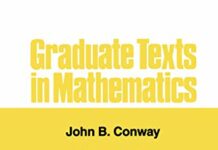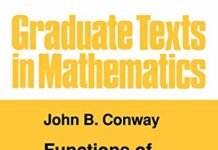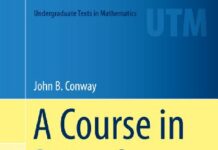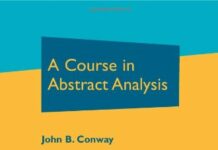
Ebook Info
- Published: 2065
- Number of pages: 372 pages
- Format: PDF
- File Size: 39.69 MB
- Authors: John B. Conway
Description
Operator theory is a significant part of many important areas of modern mathematics: functional analysis, differential equations, index theory, representation theory, mathematical physics, and more. This text covers the central themes of operator theory, presented with the excellent clarity and style that readers have come to associate with Conway’s writing. Early chapters introduce and review material on C*-algebras, normal operators, compact operators and non-normal operators. The topics include the spectral theorem, the functional calculus and the Fredholm index. Also, some deep connections between operator theory and analytic functions are presented. Later chapters cover more advanced topics, such as representations of C*-algebras, compact perturbations and von Neumann algebras. Major results, such as the Sz.-Nagy Dilation Theorem, the Weyl-von Neumann-Berg Theorem and the classification of von Neumann algebras, are covered, as is a treatment of Fredholm theory. These advanced topics are at the heart of current research. The last chapter gives an introduction to reflexive subspaces, i.e., subspaces of operators that are determined by their invariant subspaces. These, along with hyperreflexive spaces, are one of the more successful episodes in the modern study of asymmetric algebras. Professor Conway’s authoritative treatment makes this a compelling and rigorous course text, suitable for graduate students who have had a standard course in functional analysis.
User’s Reviews
Editorial Reviews: Review “John B. Conway belongs to the best authors of basic textbooks … The present book continues this tradition of clear and elegant way of presentation. … this book can be highly recommended for students of operator theory as well as to experts in the field who will find many interesting ideas there.” —- Mathematica Bohemica
“Conway’s book adds a complementary volume of study for those just becoming acquainted with the field … shares … a style which is relaxed, yet concise … recommend it to anyone wishing to gain a better understanding of operator theory.” —- Bulletin of the London Mathematical Society
“This is an excellent course in operator theory and operator algebras … leads the reader to deep new results and modern research topics … the author has done more than just write a good book–he has managed to reveal the unspeakable charm of the subject, which is indeed the `source of happiness’ for operator theorists.” — –Mathematical Reviews”Conway’s book adds a complementary volume of study for those just becoming acquainted with the field … shares … a style which is relaxed, yet concise … recommend it to anyone wishing to gain a better understanding of operator theory.” —- Bulletin of the London Mathematical Society”This is an excellent course in operator theory and operator algebras … leads the reader to deep new results and modern research topics … the author has done more than just write a good book–he has managed to reveal the unspeakable charm of the subject, which is indeed the `source of happiness’ for operator theorists.” —- Mathematical Reviews From the Publisher Professor Conway’s authoritative treatment makes this a compelling and rigorous course text, suitable for graduate students who have had a standard course in functional analysis.
Reviews from Amazon users which were colected at the time this book was published on the website:
⭐Today operators are most associated with complex, leading edge operator algebras. However, the more general term, and the first part of this wonderful volume, includes much more general operator theory, which is ubiquitous in all of mathematics. Before the incredible beauty and symmetries, as well as clever surprises in operator algebras became the current focus, operators were most frequently explored as wonderful ways to grasp linear algebra and vector spaces and mappings more intuitively.Of course the calculus operators of grad/ div/ rad/ curl/ differentiate/ integrate and their twin cousins in analysis using functionals as well as functions extend beyond the current algebra research focus to geometry, Laplacians, Fourier and many other transforms, probability theory, and nearly every other area of math.When metaphysics wonders if “math” is a tool used to understand the universe, or a tool used BY the universe, the serious side of the issue almost always involves the beauty, function and ubiquitous appearance of operators, which in lie algebras and quantum physics seem to somehow be part of the “fabric” of the paths themselves, not just their explanations or calculations!This is a wonderful overview, but certainly not a “lay” or beginner treatment, and since it is very up to date even a decade later, the majority of the coverage IS algebras– because that’s where the majority of the “action” is even today in research. Of course quantum field theory also is actively researching other aspects of operators, particular in gauge analysis and theories. The treatment is conclusively graduate unless you’re a very advanced undergrad who for some reason was really attracted to the calculus of variations and functional analysis, or algebraic mappings in general.It’s been said many times now that no one can really grasp the 600 or so current fields of math and how they relate– and the price of this specialization is death according to Mr. Darwin. If there is an exception it’s operators, and if there is any place to get a feel for the whole enchilada– it’s here. Stimulating not only as an intro to the field for folks who have mastered analysis and linear algebras and perhaps studied other algebras, geometries, etc., but also for those wanting to take a 30,000 foot view of all of math– and one of the most ubiquitous “forces” in math, regardless of coordinate system, dimension, application, etc. If one other term crosses all those boundaries today, it is not surprising that it’s the term “mapping” — which goes hand in hand with operators.Highly recommended both for courses/ course assistance and self study if you’ve got the above prereqs. Money saving tip: if you need to brush up on functional analysis or variations in general first, Dover has numerous older but still relevant titles to help us do so. A couple excellent ones are both Fomin translations:
⭐and
⭐.If you are not familiar with John Conway– as an author and teacher he is unequalled. His pedagogical style is the farthest thing from the “show off” style you’ll encounter– he takes the time, and makes the effort, to be sure you understand. From that view alone, this text is a delight.Library Picks reviews only for the benefit of Amazon shoppers and has nothing to do with Amazon, the authors, manufacturers or publishers of the items we review. We always buy the items we review for the sake of objectivity, and although we search for gems, are not shy about trashing an item if it’s a waste of time or money for Amazon shoppers. If the reviewer identifies herself, her job or her field, it is only as a point of reference to help you gauge the background and any biases.
Keywords
Free Download A Course in Operator Theory (Graduate Studies in Mathematics, Vol. 21) 1st Edition in PDF format
A Course in Operator Theory (Graduate Studies in Mathematics, Vol. 21) 1st Edition PDF Free Download
Download A Course in Operator Theory (Graduate Studies in Mathematics, Vol. 21) 1st Edition 2065 PDF Free
A Course in Operator Theory (Graduate Studies in Mathematics, Vol. 21) 1st Edition 2065 PDF Free Download
Download A Course in Operator Theory (Graduate Studies in Mathematics, Vol. 21) 1st Edition PDF
Free Download Ebook A Course in Operator Theory (Graduate Studies in Mathematics, Vol. 21) 1st Edition




